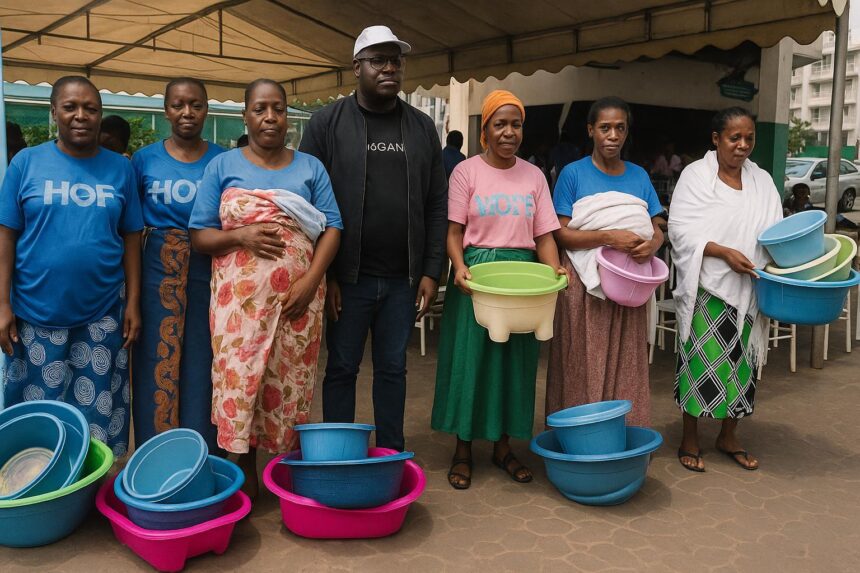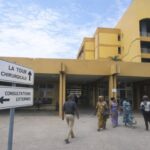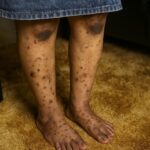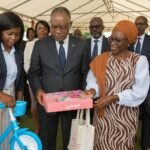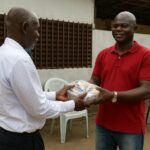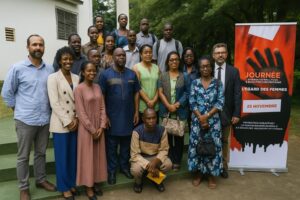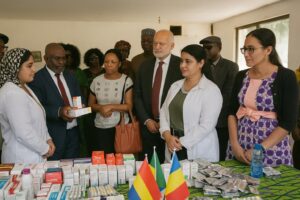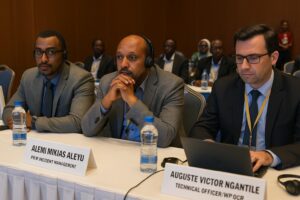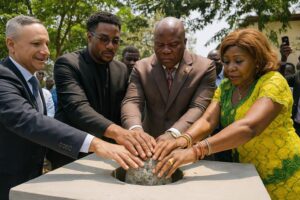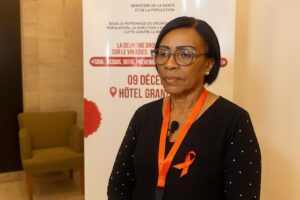Community health drive in Ouenzé
On 6 September, the narrow streets of Ouenzé’s fifth district filled with blue aprons and white buckets as volunteers from the Harris-Oyo Foundation set up their mobile stands outside the Jeanne-Vialle Integrated Health Centre.
Backed by the local NGO Source de Bien, the team launched a campaign combining hygiene education with the free distribution of medical and household supplies, an operation timed to reinforce the national alert against seasonal cholera outbreaks.
Health officials told our newsroom the initiative complements recent advisories from the Ministry of Health urging hand-washing, safe water storage and early consultation at the slightest diarrhoeal symptom.
“Responding quickly and visibly is crucial for trust,” said Junior Mahoungou, coordinator of Harris-Oyo Foundation, stressing that community presence can “turn public warnings into practical action” (Radio Congo interview, 7 September).
Inside the kit: what families received
Cardboard cartons opened like treasure chests, revealing antibiotics, oral rehydration salts, surgical gloves and rapid bacteria analysers earmarked for the Jeanne-Vialle laboratory.
For households, volunteers handed over plastic basins, covered buckets, cotton pagnes, baby sheets and long bars of soap—items selected after field surveys found that basic washing equipment is often the first line of defence against waterborne pathogens.
Pharmacist Brice Ibala, overseeing the storage room, explained that essential medicines remain expensive for many urban families despite subsidies, adding that “one blister of zinc tablets can decide whether a toddler recovers or slips into dehydration.”
Organisers said nearly 300 families received kits within three hours, a figure consistent with previous drives recorded by the municipal social affairs office, which keeps anonymised wp-signup.phps to track follow-up visits.
Mothers on the frontline of prevention
Under a striped tent, midwives conducted mini-workshops where mothers practised the 20-second hand-wash with chlorinated water, a habit cholera specialists rank alongside vaccination in impact.
Thirty-two-year-old Mireille Nkounkou, carrying her nine-month-old son, voiced relief: “Water prices rise every dry season; soap is a luxury. Today I go home with both, plus knowledge I can share with neighbours.”
According to UNICEF data cited by regional media, children under five account for nearly half of cholera cases in Central Africa, making maternal awareness campaigns a cornerstone of prevention.
Community worker Aline Samba noted an encouraging shift: “When women lead the queue instead of men, we know the message about home hygiene has landed.”
Partners speak out on shared mission
The operation stems from a long-standing alliance between Harris-Oyo Foundation, created by MP Romi Oyo, and Source de Bien, led by entrepreneur Carine Miere.
“Our duty is to stay close to the people who raise this nation,” Miere said, highlighting plans to extend the programme to Talangaï and Mfilou before year-end (Les Dépêches de Brazzaville, 6 September).
Clinic director Dr. Grâce Louvouezi thanked donors for delivering not only equipment but also recognition: “Staff morale grows when outsiders validate our daily battles against preventable diseases.”
Local councillor Théophile Ngatsé added that private support complements government initiatives, citing the Health Ministry’s ongoing renovation of boreholes across Brazzaville’s northern districts.
Why cholera remains a threat
Brazzaville recorded isolated cholera cases earlier this year after heavy floods disrupted water supplies, according to the regional health directorate, underscoring the pathogen’s ability to resurface wherever sanitation falters.
Epidemiologist Dr. Armand Mouyabi explains that urban density in districts like Ouenzé accelerates transmission: “One contaminated bucket can serve ten households; education plus equipment is therefore a double barrier.”
The World Health Organization lists safe water infrastructure, community mobilisation and prompt rehydration therapy as the triad that keeps case-fatality rates below one per cent, a benchmark Congo aims to maintain.
Looking ahead: sustaining the momentum
Health experts caution that one-off donations must dovetail with long-term infrastructure upgrades, including reliable chlorination at water points and regular garbage collection that limits breeding grounds for Vibrio cholerae.
Harris-Oyo Foundation representatives say post-distribution monitoring will measure kit usage, malnutrition rates and clinic attendance, with results feeding into the national early-warning system being piloted by the Congolese Agency for Public Health.
Meanwhile, social media images of smiling mothers holding blue buckets have sparked a wave of community pride, illustrating how visibility can multiply the reach of a single local gesture.
As the rainy season approaches, Ouenzé’s residents may face renewed sanitary challenges, but the lessons and supplies shared this week aim to help families transform caution into daily routine, reducing the odds of future outbreaks.

